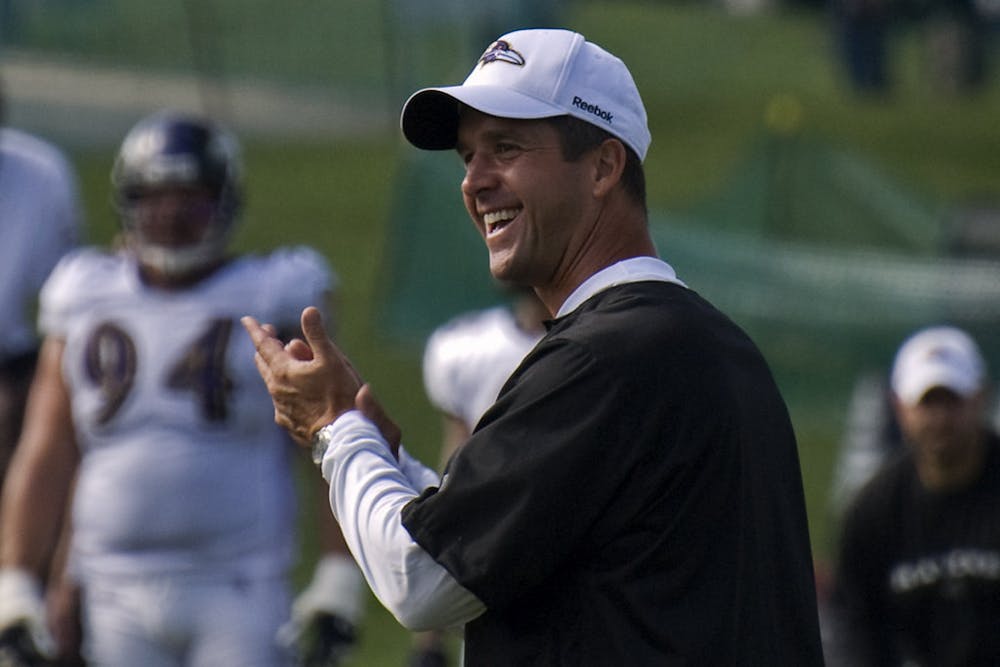
In a rather anticlimactic finale to a long, suspenseful search, Todd Monken, former offensive coordinator for the University of Georgia, was hired as offensive coordinator for the Baltimore Ravens on Feb. 14.
After 21 interviews with 14 separate candidates, John Harbaugh brings in a coach with both rushing and passing proficiency. In his past two seasons with Georgia, both of which ended in national championships, Monken raised the average rushing yards per game by 6% and the average passing yards per game by 13%. In their past two seasons, Georgia went 29–1 and won two national championships.
For the Ravens, who have remained a run-first offense ever since Greg Roman was hired four seasons ago, Monken is undoubtedly a middle-of-the-road decision. He offers the Ravens the opportunity to retain their run-first identity with the hope that the passing game takes a big jump, a general trend in philosophy that has continued from Lamar Jackson’s MVP season.
Speaking of Jackson, the search for a new offensive coordinator has largely been framed by the media as a negotiating tactic for Jackson’s return. Contract talks have all but stagnated — it has now been over a season since we’ve heard they have been “in talks” on an extension. At the end of the season press conference, Harbaugh and General Manager Eric DeCosta both expressed their desire for Jackson to stay a long time in Baltimore. They also made sure to mention Jackson would have a say in who is hired to call plays.
Let me dispel one myth before I analyze Monken’s fit for Baltimore — Jackson has proven that he can thrive in a pro-style, pass-heavy offense. During his time in Louisville, his offensive coordinator Bobby Petrino ran a pro-style offense, and Jackson passed for 9,043 yards and 69 Touchdowns with an overall rating of 142.9.
Much of the general dislike for Roman has been due to his backward, college football approach to play calling in the NFL. It may seem worrying that the Ravens would go with a college football coach for their most important offensive coaching position. However, Monken has his own experience in the NFL and even ran a pro-style offense himself, to great success.
The makeup of the Georgia Bulldogs team is very similar to that of the Baltimore Ravens. They have a very strong defense (which gets most of the credit) and a consistently great offense. Ever since Jackson was made the Ravens starting quarterback, the offense has seen new heights, particularly in the running game.
And this past season, with the addition of safety Marcus Williams, linebacker Roquan Smith and first-year defensive coordinator Mike Macdonald from the stubborn defense at the University of Michigan, the Ravens' defense is looking to be just as strong. With new attention being spent on the offense, the hope is that the Ravens can retain this impressive, star-studded defense with a new and improved, balanced offensive scheme.
What only improves this hope is the Ravens’ cap space. They have $24.3 million in space, the ninth most in the league, which means signing a big free-agent wide receiver is a real possibility.
In general, the Monken hire is the perfect marriage, and a good hire that could potentially give Harbaugh a few more years in Baltimore than fans initially hoped for. It doesn’t go against the Ravens’ “established identity,” as Harbaugh has said time and time again, but it does represent a shift in that identity.
While it isn’t the fan favorite choice, as Eric Bieniemy is looking to spend his next season with the Washington Commanders, it might be the best option — running the ball has gotten Baltimore far. Rather than abandon this success, Monken can improve upon it, and with him as offensive coordinator the future in Baltimore is bright.





